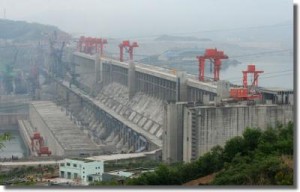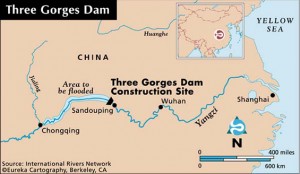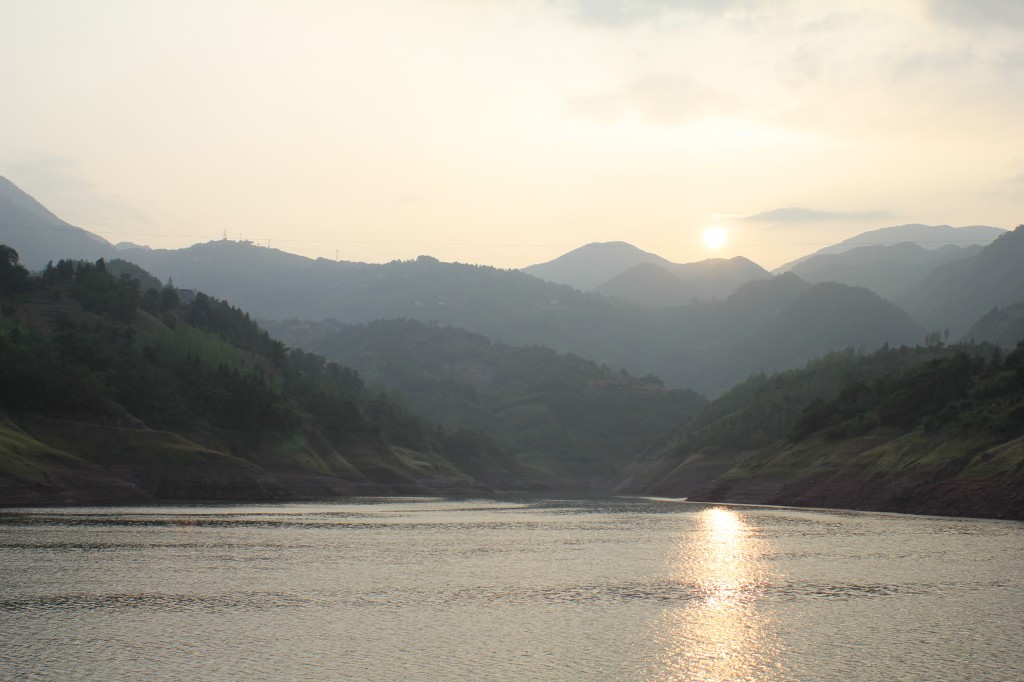I felt one of the highlights of my time in China was going to be the three days spent on a boat on the Yangtze River. I had read stories, studied maps, and watched movies about this mammoth river, which wound its way from the Tibetan Plateau so many miles south, past the pearl of the orient, Shanghai, and into the South China Sea. I have been fortunate enough to spend some time on our own great American river, the Mississippi, and I imagined that it might be as large and wide at that famous waterway. Moving tons of shipping up and down through the interior of a powerful country whose agricultural lands stretched far beyond the coast. This wealth of food had lacked only a way to reach the international markets beyond the oceanic borders. As I had seen, from Vicksburg to New Orleans, on the mighty Mississippi, a waterway of this size could move all the corn and rice that the world needed.
I knew that a big part of the experience, maybe an understatement considering the size of the project, would be the Three Gorges Dam. The dam had been extremely controversial in a country that does not tolerate controversy. The gorges, which has been the subject of so many poets and painters, would be changed forever by the new lake which would be formed. It would submerge some 1,100 towns and cities, flood countless tombs and temples, and drown thousands of acres of farmland which provided the food for over a million people who would be told to move. The water would rise 400 meters in some places and the sinking towns would be asked to move uphill accordingly. People, I was told by my guides, accepted this as the needed sacrifice of progress. A country must grow, sometimes painfully, but if that growth will provide for the many, with power and water, than often the few who live those valleys through which the mighty rivers run must bear the burden. In the building of the Three Gorges Dam, many would have their lives changed so that China could continue to expand economically.

The dam would provide the same amount of electricity as a 1,000 coal fired power plants my guide said. It would control the devastating floods which had occurred frequently throughout the Yangtze’s history. It would be a symbol of power and growth for a country which desired to move into the first world and become, if it has not already, the primary economic player in the world. This part I understood, and I liked the idea of hydro-electricity replacing coal in a country which is said to produce 25% of all the worlds annual greenhouse gases. In the book, River Town, the residents of the town Fuling, a city sinking beneath the rising water, often responded with shrugs and a mixture of what can I do about it, as well as, feeling that it is needed so that China can grow. China has always struck me as country where the individual needs are not championed as much as the glorification of the individual’s sacrifice for country. It is a nation where over 95% of the people are from the same Han ethnic group, making them extremely homogeneous as a people, and this engenders their sense of solidarity in the face of painful struggles and changes. A stark contrast from our United States with its wonderful mix of Irish, Italians, Indians, Germans, Central Americans, which give us tremendous strength but also polarizing differences of opinion.
 Despite this unified ethnic makeup I knew there must be tremendous suffering among the people who were being asked to give up their farms and homes to make way for the rising river. I saw that the government had built new condominiums, often with amenities that were not available before, to replace the housing that would be lost. People might have air conditioning, indoor water and toilets, and maybe even television now, but what was impossible to replace was the land. The soil near the river had been rich and had sustained the people for a millennium. For many it had provided the families vegetables for consumption and perhaps, on a good year, a small amount to sell. Their home had been replaced but this black fertile soil was submerged for the sake of the country.
Despite this unified ethnic makeup I knew there must be tremendous suffering among the people who were being asked to give up their farms and homes to make way for the rising river. I saw that the government had built new condominiums, often with amenities that were not available before, to replace the housing that would be lost. People might have air conditioning, indoor water and toilets, and maybe even television now, but what was impossible to replace was the land. The soil near the river had been rich and had sustained the people for a millennium. For many it had provided the families vegetables for consumption and perhaps, on a good year, a small amount to sell. Their home had been replaced but this black fertile soil was submerged for the sake of the country.
As we rode the bus through the port city, after leaving the river boat, I saw squash and cabbage growing in every possible crack in the sidewalk, rooftop, and alleyway available. Our government tour guide callously pointed out the ingenuity of the people who could grow food in this way and told us how happy they were to garden and share food with one another. It was an ‘abundance for all’ type speech made cheap by the stares of the men sitting without work, playing Majong and poker at small tables along the road. Waiting, without work, for the tourist to descend on them in the hope of selling fake jade or t-shirts, or little red Mao books. I knew that this growing of urban gardens was not a hobby for them, as it is in so much of San Francisco now, and that perhaps a small plot was what they desired, something more productive than the ditches on the side of the new road. I recently watched the documentary, Up The Yangtze, in which the same tour guide is featured. Telling the Americans about how happy the villagers are in their new homes, how clever they are in planting in the gaps in the pavement, all the while covering his mouth and laughing at his comments in English which the towns people could not understand. It is only after the Americans leave that the pain, tears, and suffering of the people becomes apparent. The stories of police brutality, forced relocation, and new found poverty where people not only do not have money, that was never a luxury there, but also have no food or farm to work on. The greatest pain for a man or women, as we have seen over these past years in America, is the inability to find work, to support family, to know home.
China is a very complicated place and culture and I have only seen the first layer of its most superficial level. These are my thoughts on a short visit and the research done, before and after. I highly recommend the book, River Town, by Peter Hessler, and the documentary, Up The Yangtze, by Yung Chang. Above all, I encourage you to go and visit China for yourself.


Wow, thank you for bringing up the topic we don’t talk much about in the West – the biggest dam in the world displacing more than a million.
A friend wrote a book about the Three Gorges Dam and a widower who saves an abandoned baby girl from the Yangtze. http://www.limiaolovett.com
it’s fiction but never the less moving.